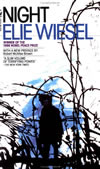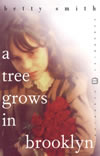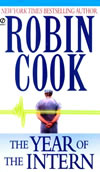
Night
By Elie Wiesel
When I was 14 years old, I had to do a book report, so my mom and I went to a library and picked this out. It's a memoir written from a teenager's point of view. In 1944, Elie and his family are sent to Auschwitz by the Nazis, where he watches his father suffer. Reading it changed my relationship with my parents. Instead of talking about kid and family stuff, I was asking them if they knew about the Holocaust and what had happened to European Jews. They said yes, and, with their encouragement, I began to grapple with the ideas of good and evil, the vastness of the world, and the power of the human spirit.
By Elie Wiesel
When I was 14 years old, I had to do a book report, so my mom and I went to a library and picked this out. It's a memoir written from a teenager's point of view. In 1944, Elie and his family are sent to Auschwitz by the Nazis, where he watches his father suffer. Reading it changed my relationship with my parents. Instead of talking about kid and family stuff, I was asking them if they knew about the Holocaust and what had happened to European Jews. They said yes, and, with their encouragement, I began to grapple with the ideas of good and evil, the vastness of the world, and the power of the human spirit.

A Tree Grows in Brooklyn
By Betty Smith
My mom gave me this for my 20th birthday. The story is about a family living in Brooklyn who doesn't have money. The father is an alcoholic and always trying to find work. Still, his daughter, Francie, believes in his hopes and dreams. Then, when she's 14 years old, he dies. My dad died from a heart attack when I was 18. The minute I knew he was gone forever I felt like I was a little girl again. All of a sudden I was lost: How could I not have his wisdom, his discipline that drove me crazy, all the things that I treasured? I sobbed the whole way through this book.
By Betty Smith
My mom gave me this for my 20th birthday. The story is about a family living in Brooklyn who doesn't have money. The father is an alcoholic and always trying to find work. Still, his daughter, Francie, believes in his hopes and dreams. Then, when she's 14 years old, he dies. My dad died from a heart attack when I was 18. The minute I knew he was gone forever I felt like I was a little girl again. All of a sudden I was lost: How could I not have his wisdom, his discipline that drove me crazy, all the things that I treasured? I sobbed the whole way through this book.

The Year of the Intern
By Robin Cook
I read this novel after I finished nursing school and was finally working as an RN. I was in love with the interns and thought if I read this and figured out how their minds work, maybe one of them would love me back. Instead I wound up being reminded what a challenge it is to keep your ethics as a human being while working as a healthcare professional. For me laughter became the key.
When I was at Northwestern Memorial Hospital in Chicago, I began taking improv classes at a theater called Second City. It was a lot like storytelling in the old neighborhood, except eventually I got paid for it. I kept my job at the hospital and did shows at night. Whenever I could, I'd bring the whole cast to the hospital and we'd do the act in a corridor.
One night a patient named Rudy told me, "You should go out to California and audition for stuff." I said, "Oh, I'd never do that. I'd be humiliated. I'd fail. Then I'd have to come back and explain it to everybody." Rudy said, "I'm at the end of my life. I only have a few weeks to live, and my biggest regret is that I feared failure. Promise me that when I'm gone, you'll go and fail many times in California."
We shook hands on it.
By Robin Cook
I read this novel after I finished nursing school and was finally working as an RN. I was in love with the interns and thought if I read this and figured out how their minds work, maybe one of them would love me back. Instead I wound up being reminded what a challenge it is to keep your ethics as a human being while working as a healthcare professional. For me laughter became the key.
When I was at Northwestern Memorial Hospital in Chicago, I began taking improv classes at a theater called Second City. It was a lot like storytelling in the old neighborhood, except eventually I got paid for it. I kept my job at the hospital and did shows at night. Whenever I could, I'd bring the whole cast to the hospital and we'd do the act in a corridor.
One night a patient named Rudy told me, "You should go out to California and audition for stuff." I said, "Oh, I'd never do that. I'd be humiliated. I'd fail. Then I'd have to come back and explain it to everybody." Rudy said, "I'm at the end of my life. I only have a few weeks to live, and my biggest regret is that I feared failure. Promise me that when I'm gone, you'll go and fail many times in California."
We shook hands on it.
Cagney by Cagney
By James Cagney
An actor I knew from Second City gave me this book when I came out to Los Angeles. It was a strange time for me because I was so grateful to land any acting job, but I'd often get frustrated with the scripts. I'd think, "People just don't talk this way." In his autobiography, the actor James Cagney explains how he adjusted dialogue because every little moment on screen meant something to him. Every little moment means a lot to me, too.
Reading about Cagney helped me muster the courage to protect the characters I portray. If I'm playing a mom, I want to make her so real and so accessible that women relate to her and aren't threatened by her image. There's so much garbage out there that I don't know how women with kids watch it. They see these perfectly skinny women with no wrinkles. I take great pride in making sure that the characters I represent have a point of view and three dimensions.
By James Cagney
An actor I knew from Second City gave me this book when I came out to Los Angeles. It was a strange time for me because I was so grateful to land any acting job, but I'd often get frustrated with the scripts. I'd think, "People just don't talk this way." In his autobiography, the actor James Cagney explains how he adjusted dialogue because every little moment on screen meant something to him. Every little moment means a lot to me, too.
Reading about Cagney helped me muster the courage to protect the characters I portray. If I'm playing a mom, I want to make her so real and so accessible that women relate to her and aren't threatened by her image. There's so much garbage out there that I don't know how women with kids watch it. They see these perfectly skinny women with no wrinkles. I take great pride in making sure that the characters I represent have a point of view and three dimensions.
Don't Die on My Shift
By William F. Sayers
In high school, I worked as a nurse's aid in a nursing home, and sometimes I'd come home and say, "Oh my God. You wouldn't believe my crazy patients!" So my brother Kevin, who was in medical school, gave me this book and told me to take care of each patient with love. It was written by a man who had polio and was in an iron lung for 13 years. His only view of the world was from a mirror on the iron lung that allowed him to see behind himself a few feet. Once, when he was in terrible pain—which he describes so well—he asked a nurse for some water. And the nurse kept walking by, saying, "I'm not your nurse."
After reading the book, I knew that those words would never come out of my mouth. Whether I'm on a bus or in a hospital, if anyone needs help, I'm their nurse.
By William F. Sayers
In high school, I worked as a nurse's aid in a nursing home, and sometimes I'd come home and say, "Oh my God. You wouldn't believe my crazy patients!" So my brother Kevin, who was in medical school, gave me this book and told me to take care of each patient with love. It was written by a man who had polio and was in an iron lung for 13 years. His only view of the world was from a mirror on the iron lung that allowed him to see behind himself a few feet. Once, when he was in terrible pain—which he describes so well—he asked a nurse for some water. And the nurse kept walking by, saying, "I'm not your nurse."
After reading the book, I knew that those words would never come out of my mouth. Whether I'm on a bus or in a hospital, if anyone needs help, I'm their nurse.




